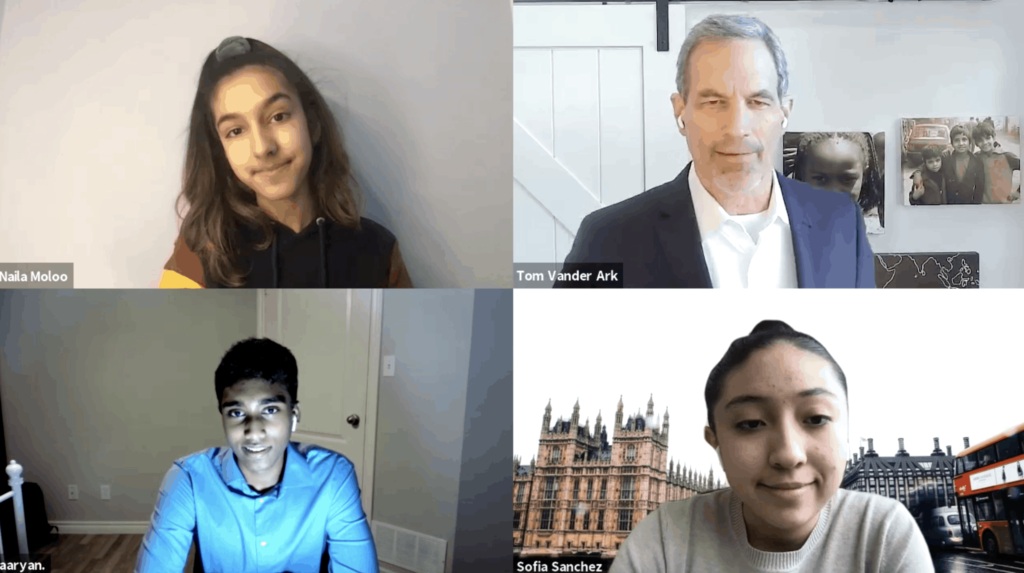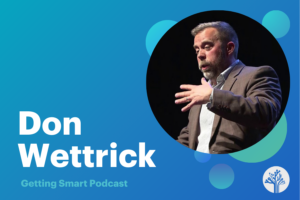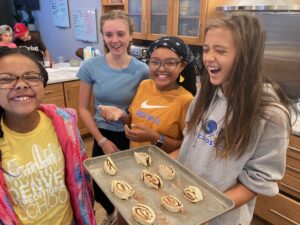Learners from The Knowledge Society on Making the World a Better Place

On this episode of the Getting Smart Podcast, Tom Vander Ark sits down with three outstanding learners who are passionate about Difference Making, innovation and making the world a better place. All three students, Sofia Sanchez, Naila Moloo and Aaryan Harshith are high schoolers and left us inspired for weeks after talking to them. These three participate in The Knowledge Society, one of our favorite after school programs. If you haven’t heard our episode with co-founder Navid Nathoo, we highly recommend it.
Sofia Sanchez is passionate about synthetic biology, biotechnology, and innovation. She attends Tecnológico de Monterrey in Mexico. She is currently learning a lot about exponential technologies to soon start a company that impacts the world positively.
Naila Moloo attends The Elmwood School in Ontario and is passionate about sustainable energy, specifically where it intersects with nanotechnology. Naila loves to learn about anything related to emerging technology, ranging from quantum physics to space exploration.
Aaryan Harshith attends Lo-Ellen Park Secondary School in Ontario and is working to create a better, healthier world through the things he builds and the research he conducts. For the past two years, his primary focus has been building a medical device to enhance cancer diagnosis during surgery and he is currently in the process of running human trials for it.
Let’s listen in as Tom talks with these learners to hear about their motivations to change the world, the emerging opportunities they see and how they keep learning.
These students are true students of the digital age. Sofia discovered her passion for biotech from a YouTube video. She loves the research that she gets to do in The Knowledge Society and, in particular, finds the mindset work useful. She also starter her own podcast, 2045, last summer.
Naila, focused first on the attention economy, primarily with respects to issues with screen time. From there, she became passionate about sustainable energy and high-temperature superconductors. Some of what she is learning at school supports her ongoing curiosity, but it doesn’t regularly provide opportunities to take deep dives into the content that she finds most fascinating.
Aaryan’s first project was using AI to diagnosis diabetes more effectively. This helped him to place in the national science fair which ultimately garnered the attention of TKS. He was eager to find a community of extremely smart people that made him always feel like he was growing. “We don’t encourage students to go deep into their own subjects enough,” he said. “TKS taught me how to deal with people, if you don’t know how to do that, you really don’t know how to live.
Sofia said that her framework shifted from “What do I want to do?” to “What do I need to do?” She also reflected on the fact that most students already have the tools they need to learn anything they can imagine, a framework that is frequently discussed at TKS.
“I’ve always wanted to make a difference, I just didn’t know how,” said Naila, “You can go on LinkedIn and just reach out to experts.” She wishes that high school more time spent on exponential technologies
Aaryan shared his belief in the compounding impact of curiosity and learning. Programs like TKS unlock a whole new dimension of alternatives for the future. He also suggested that young people, “start learning voluntarily. The things I’m researching are the things I enjoy.”
A New Initiative
“TKS‘ main goal is to train students to be innovators and to solve real-world problems. Every year, TKS announces its Global Challenge that every student participates in, and this year, TKS and the United Nations are working together on the challenge. TKS students will be working on tactical solutions to get women and girls in developing countries to thrive in the digital economy. This isn’t just for show, but is meant to produce real initiatives that the UN and partners can pursue.
Here are the three challenges students can choose from in the theme of ’empowering women in developing countries to thrive in the digital economy:'”
-
How can we enable more women and girls to access, create and influence technology by increasing digital skills and access to digital devices and the Internet by 2026?
-
How can we increase women’s employment in the digital economy by 2026?
-
How can countries provide women and girls with equal opportunities to thrive in the digital economy by implementing policies that support female inclusion by 2026?
Key Takeaways:
[:08] About today’s episode with three incredible students.
[1:38] Tom welcomes the three learners to the podcast!
[2:51] Sofia shares how she became so passionate about synthetic biology.
[3:31] How did Sofia discover TKS?
[4:21] How did Sofia turn her interest in gene editing and the gut microbiome into an incredible project?
[5:57] Was there any information on TKS about these topics or was Sofia’s learning self-directed through the internet?
[6:32] Was Sofia assisted by a coach at TKS on any of the projects that she worked on?
[7:21] Sofia speaks about her motivation for writing on Medium and hosting her own podcast, the 2045 Podcast.
[8:51] Naila speaks about her project for a science fair that led to her winning a scholarship for TKS.
[10:46] How did Naila become interested in sustainable energy, particularly superconductors?
[12:40] Does Naila study these interests at her school, Elmwood, or does she explore them outside of school?
[13:53] How did Aaryan find out about TKS? How long has he been in the program? And what kind of projects did he create for science fairs? What was his motivation?
[15:55] How is TKS different from traditional learning at Aaryan’s high school?
[17:10] What sparked Aaryan’s interest in a universal cancer vaccine?
[18:39] Sofia speaks about her evolving philosophy around difference-making.
[20:21] About Turnaround for Children’s Well-Being Index.
[21:13] How TKS has helped Naila think about where she wants to make a difference in the world.
[22:10] Aaryan shares what TKS has helped him with and inspired his vision for difference-making.
[22:57] Aaryan shares his thoughts on college vs. other post-secondary options.
[24:14] Sofia shares what is next for her after high school.
[26:00] Naila shares about the ways in which she thinks that high school could be more valuable.
[27:07] Sofia shares how she would change high school.
[27:49] Aaryan speaks about the opportunities that high schools should provide their learners with.
[28:22] Sofia shares her continuous learning tips for other young learners.
[29:38] Naila shares how she continually learns and gives advice to other students.
[30:34] Aaryan shares how he keeps learning and gives some advice to other learners as well.
[32:05] Tom thanks Sofia, Naila, and Aaryan for joining the Getting Smart Podcast!
Mentioned in This Episode:
- The Knowledge Society (TKS)
- Getting Smart Podcast Ep. 305: “Navid Nathoo on What Education Can Learn From the Real World andThe Knowledge Society”
- Sofia Sanchez’s LinkedIn
- Sofia Sanchez’s Website
- Sofia Sanchez’s Medium Profile
- 2045 Podcast by Sofia Sanchez
- Naila Moloo’s LinkedIn
- Naila Moloo’s Website
- Chronicles Of Illusions: The Blue Wild, by Naila Moloo
- Aaryan Harshith’s LinkedIn
- “LightIR: Changing the Way We See (and Treat) Cancer Forever,” by Aaryan Harshith | Medium
- Difference Making at the Heart of Learning: Students, Schools, and Communities Alive With Possibility,by Tom Vander Ark and Emily Liebtag
- Well–Being Index | Turnaround for Children
Stay in-the-know with innovations in learning by signing up for the weekly Smart Update.







0 Comments
Leave a Comment
Your email address will not be published. All fields are required.